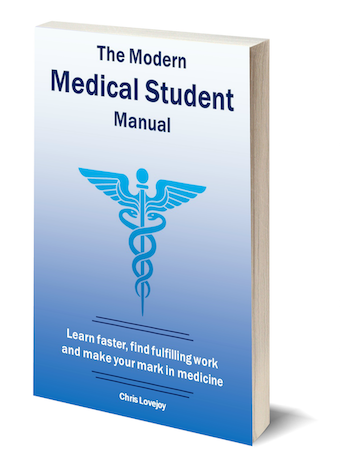If Medicine Gets You Down
I left the ward without telling anyone and headed back to my room. I slumped down on my bed, put on some music and stared at the ceiling.
It was the fifth week of my first ever clinical placement and it wasn’t going well.
I’d started out with enthusiasm. “Finally, I’ll be doing what I’ve wanted to for years!”
But I’d found it tough. Every day, I went to the wards and wasn’t really sure what I was supposed to be doing. I felt like I wasn’t learning that much and that I kept getting in everyone’s way.
Over time, this feeling of discomfort had become increasingly draining and the initial excitement had started to wear off. Getting out bed to head to the wards was becoming more of a challenge.
I started to wonder: Maybe I’m just not very good at this? Maybe medicine just isn’t for me?
If Medicine Gets You Down
During medical school there will be times when you feel low. Sometimes there will be an obvious cause, at other times there may not be. This is part of being human.
We all have fears and hang-ups, whether we are aware of them or not, and medical school can force us to confront these. As you undergo new stressful experiences, it is important to find your own ways to cope with the trials and tribulations of life and of studying medicine. Some methods are healthier than others but what’s important is that it works for you. A prominent South African trauma surgeon told me that when he is feeling down, he would take his helicopter and repeatedly take off and land while aiming for the same spot on the ground. This may sound bizarre but it worked for him.
Here are some approaches that myself and colleagues use which have been helpful. Of course, nothing that we do will guarantee eternal happiness and contentment but I share them here in the hope that they may help:
- Make a central refuelling resource
- Mix it up
- Change your physical state (and your mind will follow)
- Write your way out
- Incorporate a new daily practice
- Other suggestions
It’s worth nothing that I’m fortunate enough to have never been seriously ‘depressed’ (as medically defined) but not everybody is so lucky. In fact, mental illness and suicide rates are higher amongst medical students and doctors. If you feel at any point that there’s a chance you may be clinically depressed, seek professional help. You are not alone and there is a lot of support out there for you. Speak to your GP, phone a helpline or try some self-help CBT modules. And, especially, speak to someone before you do anything that will harm yourself or others, no matter how hopeless you may feel.
Make a central refuelling resource
“Dear Future Chris,
I’ve compiled this resource for you.
For when you feel drained of energy, disheartened or depressed, frustrated, confused or overwhelmed, with no apparent end in sight.
Use this book to give you the strength and energy to push through.
Past Chris”
This is the first message in my central refuel document that I started creating about half-way through medical school. I have continually added new content to it since then. It now contains a mix of quotes, short letters to myself, photos, thoughts, reminders of experiences to induce certain emotional states, videos, suggested actions and more. I’ve very much tailored it to what I know my bummed-out self will respond to.
Mine is an electronic document but friends of mine have written in notebooks or collected things in folders. Such refuelling resources can be an effective way to reconnect with yourself and remember your priorities. They can be effective for pulling you out of a low mood.
Mix it up
A lack of variation can make us feel stuck in a rut. The best solution for this is to deliberately do something we’ve never done before. It can be anything that breaks up the normal pattern of things.
Ask yourself ‘What’s one thing I could try that I’ve never done before?’
Maybe you want to sit in the park and read a book. Maybe you want to sign up for a dance class. Maybe you want to join a new club.
It can help if it is something outside of your comfort zone. You could go to a party where you only know one or two people. You could go out for dinner or to the cinema by yourself. You could ask that girl or guy on a date.
It can literally be anything (as long as it’s legal). Be creative and be impulsive. Don’t stop and rationalise, just do it.
Change your physical state (and your mind will follow)
Science has shown that our body has a massive impact on our mind. If we smile, our mind starts to assume we are happy. If we walk with a confident posture, we start to feel confident.
Two useful ways to improve your state of mind are to:
1. Get moving
If you’re feeling stagnant, bored, frustrated or down for whatever reason, getting your body moving can be a great help.
Go for a walk outside. If you find motivation difficult, just focus on getting your shoes on. Then focus on getting out of the front door. With each action, your momentum will build. By the time you are home from your walk you may feel reinvigorated.
While walking, look around you. Let the beauty of the world wash over you. Take your time. Forget about the world.
Listening to music or an audiobook while you walk can help. Classical music such as Ludovico Einaudi can be relaxing. Motivational audiobooks, such as Tony Robbins’ “Unleash the Giant Within” or Brian Tracy’s “Maximum Achievement”, can help to get your motivation back up.
2. Take an ice-cold shower
Forcing yourself to stand under icy cold water for 30 seconds or so can have an immense ‘resetting’ effect on your mind and be reinvigorating. If you find it too difficult, you can gradually work up to it. It requires motivation to overcome the initial resistance to the cold water but after pushing through the initial discomfort, it can feel uplifting and sensational.
Write your way out
Writing can be a great way to process thoughts, feeling and emotions and can lift you out of a funk.
One powerful technique is a form of free writing as follows.
Open a blank document, put your hands on your keyboard, and just start writing about whatever comes to mind.
Don’t allow yourself to stop. Don’t correct any typos or grammatical errors. Don’t let more than a second go by without one of your fingers tapping a key. It doesn’t matter if you type so fast you can’t read what you’ve written – don’t try and read it back until later. Just keep going.
One thing that can happen is you finish typing a section and suddenly go “wow, I didn’t realise I cared so much about that…” or “ohhh, that’s what has been upsetting me”.
Incorporate a new daily practice
Certain things, when done on a consistent basis, can have a dramatic improvement on your mood. The best way to achieve this consistency is to incorporate it into your daily routine.
For example, the “Five Minute Journal” is a book which prompts you every morning to write three things you are grateful for and three things that will make the day great. Then in the evening it asks you to write three amazing things that happened that day and how you could’ve made the day better. While it sounds simple and cheesy, it has been shown to boost both gratitude and productivity.
Other popular daily practices include goal setting (Brian Tracy recommends writing out your top ten goals from memory every morning), brainstorming (Earl Nightingale recommends naming a problem every day and thinking of twenty possible solutions) and meditation or prayer (depending on your spiritual preferences).
If unsure, trial a technique for 30 days and then decide whether you wish to continue.
Other suggestions
Pick up your phone and call a friend you haven’t spoken to in a while.
Think of 10 things right now that you are grateful for.
Tim Ferriss advises having at least one evening a week in the company of three or more friends.
“Fall 99 times, rise 100” - Japanese Proverb
BONUS CHAPTER 1 SUMMARY
- Medicine and life can get us down. Some things that can help include making a refuelling resource, mixing things up, getting physical, free writing and new daily practices.
Continued in Bonus Chapter 2.
status: No status —
This is a chapter from The Modern Medical Student Manual. A full list of chapters are below:
- Introduction: From That Day To This Book
- Chapter 1: Medicine from Fifty Thousand Feet: Perspective, Targets and Limits
- Chapter 2: The Fundamentals of Fast Learning - Part 1 and Part 2
- Chapter 3: Mastering Clinical Medicine - Part 1 and Part 2
- Chapter 4: Increasing our Impact (and the power of Self-Education) - Part 1 and Part 2
- Chapter 5: A Scientific Approach to Research - Part 1 and Part 2
- Chapter 6: Commanding Clearer Communication - Part 1 and Part 2
- Conclusion
Plus Bonus Chapters:
- Bonus Chapter 1: If Medicine Gets You Down
- Bonus Chapter 2: Is Medicine Right For Me?
- Bonus Chapter 3: Memorisation Techniques (by Dr James Hartley)
- Bonus Chapter 4: Learning from Others in Medicine

